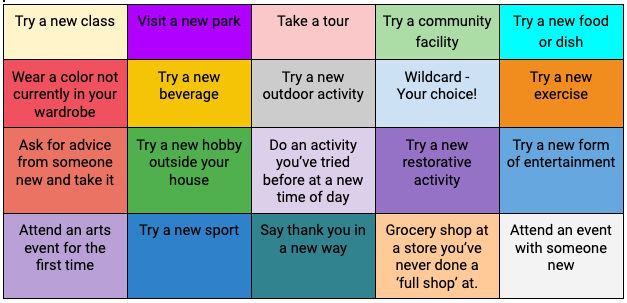Happiness
Try This Summer Challenge Bingo Card for a Mental Refresh
Novel activities are a way to diversify your emotions and boost your happiness.
Posted June 9, 2023 Reviewed by Vanessa Lancaster
Key points
- Mood hygiene refers to the activities and habits that support your happiness and mental well-being.
- Engaging in enjoyable activities that provide a sense of accomplishment is good for mood hygiene.
- Novel activities can boost self-awareness, foster resilience, diversify emotions, and enhance relationships.

Mood or emotional hygiene refers to the activities and habits that support your happiness and mental well-being. It includes your behavior, thinking, physical habits, emotional management, and relationships.
When it comes to behavior, we know that frequently engaging in activities that provide pleasure or a sense of accomplishment is good for mood hygiene. We also know that novel activities–behaviors that are new to you–are helpful.
Let me explain why. Novel activities help expand your sense of self, develop your strengths and resilience, provide emotional diversity, and can result in forming or strengthening diverse relationships. By emotional diversity, I mean they can provide emotions you might not experience much in everyday life, such as awe, surprise, pride, joy, gratitude, and other positive emotions associated with challenge or discovery. I like to think of happiness as similar to garden soil. You want a lot of diverse nutrients (emotions) in the soil to grow the best plants, as well as good external conditions like sunshine, water, and low wind.
Summer is often a time when our routines are a bit different, and we feel like trying something new. To give you some inspiration and reduce choice overload, I've come up with a summer challenge bingo game.
Here's How the Summer Challenge Bingo Card Works
Important
You don't need to complete every square. The idea is that you complete one column or row of your choice or even a diagonal of at least four squares if you're inclined.
Tips
- Don't think too narrowly. For example, an "arts event" could be a book club. A "new form of entertainment" could be an escape room, a drive-in movie, or bird watching.
- Try using the power of habits to improve your success. For example, plan how you'll complete a square each Tuesday morning. Since many of the squares are related to events, you probably won't be able to complete the squares at the same time each week, but you can make a habit of when you do your research and make plans and commitments.
- If you're stuck for ideas, try incorporating/combining an idea from another row. For example, for the square "Attend an event with someone new," other rows and columns may give you ideas for the type of event you'd like to attend.
- If you find yourself thinking narrowly, ask someone who tends to think differently from you for their interpretation.
- A few summery ideas are partaking in star gazing and astronomy clubs, hiking clubs, ranger-led events held on state or federal public land, events run by local libraries or your city or county, "openings" such as a new park or recreation center, and events intended for or with children.
- Connecting with "enthusiasts/hobbyists" can be a good way of stimulating diverse emotions. For example, the most stimulating thing about bird watching to you might be meeting people who love bird watching rather than seeing birds.
- You can make this challenge social by completing it with a friend or family member.
Rules
These aren't rules so much as intentions. If you need to make adaptations or want to add your own flair, you, of course, can.
- I haven't always inserted the word "new" in every cell. But, I mean for everything to be new to you, such as a community facility you've never been to (recreation center, library, aquatic center, etc.).
- I intend for these to be activities you do outside your house.
- Make the most of summertime by doing some outdoor activities (apologies to Southern Hemisphere readers–I know it's not summer for you).
- Expand easy activities, such as experiencing that new beverage in some new-to-you location.
- For at least one of your activities, try to be as creative or resourceful as possible in deciding what fulfills the criteria.
- The colors don't signify anything. I merely wanted to make the table more visually interesting.
- Keep it fun.
- Remember that one of this exercise's mental health goals is to stimulate a diverse range of positive emotions. Try including some activities likely to hit those. For example, stargazing or taking in the work of someone who is an expert at their craft are good activities for stimulating awe.
- If you're interested in more ideas about designing your summer, author Gretchen Rubin talks about this each year in her podcast.1
References
1. Gretchen Rubin. 431: Design Your Summer, an Easy Hack to Have More Fun with Food, and a Talk on the Joy of Dressing. https://gretchenrubin.com/podcast/431-design-your-summer-an-easy-hack-t…


